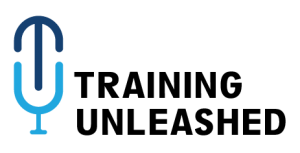Leadership in the new post-pandemic world with Kevin Eikenberry
In this episode of Training Unleashed, Evan Hackel interviewed Kevin Eikenberry an individual who expresses his views on leadership, training, and other topics in a way that is unlike anyone else – he is different and very, very smart.
Remote Working Is Not Really New
Evan pointed out that he has long been working remotely, and letting employees of his companies do so too, for years. He noted that since working remotely became common during the pandemic, he has lost one of his preferred tools for recruiting employees. Pre-pandemic, offering candidates the chance to work from home was highly attractive. Now, it has become routine.Kevin, from his side of the conversation, recalled similar experiences. “I’ve been leading a remote team or a hybrid team for over a decade,” Kevin told Evan. “And then about seven years ago, we formed the Remote Leadership Institute as a part of our larger organization. I was working with a gentleman named Wayne Turmel. And his whole focus was around remote communication for trainers, for presenters, for salespeople, etc. And so we brought all of our leadership work together under the umbrella of the Remote Leadership Institute. And now we’ve written several of books in this area, one called The Long Distance Leader and then more recently, The Long Distance Teammate. So we’ve been in this space helping people work remotely for a lot longer than the pandemic.”
The Fundamentals of Leading Have Not Been Changed by Remote Work
Kevin told Evan something about leadership that is simple, yet important. He explained that even though people are working remotely and will continue to do so, where they work might not be what matters most.
“For our latest book, The Long Distance Leader” he said, “we identified rules for remarkable remote leadership. And the first rule is, leadership first.”
He went on to explain that when new changes happen – like remote work – people tend to focus exclusively on them. But remote work has not changed what it means to be an effective leader.
“So let’s not lose sight of what we already know that works,” he told Evan.
Yet Some Things Have Changed
Evan noted that pre-pandemic, people would arrive at work and, first thing, engage in casual conversations to catch up with each other. And those “water cooler” conversations improved working life and teams.
And Kevin agreed that because that kind of socializing has been all but eliminated over the last year, there are risks.
“What’s different about work now,” Kevin said, “is that we don’t have incidental and accidental communication anymore. We may therefore have less trust in each other yet need trust more than we did before. The longer we have worked by ourselves, the more pressures and tensions have shown up for us in our work.
“It has become harder for people to remember that they’re part of something bigger than themselves. And at the end of the day, that is the single most important thing.”
Remote Tools Can Deliver Better Training
During the pandemic, most professional people became much better at using video meetings to communicate more efficiently. Now, Kevin points out, is a good time to use our new skills to extend the reach of and effectiveness of training.
“In my case,” Kevin said, “I work with clients all over the world. I’ve got to know all the tools, right? Zoom and Microsoft Teams and WebEx and all that. We all need to know them well.”
Evan and Kevin agreed that certain popular video conferencing tools, like breakout rooms, can function just like breaking a training group into sub-groups.
About Our Guest
Kevin is co-author of the book The Long-Distance Teammate: Stay Engaged and Connected While Working Anywhere (Berrett-Koehler Publishers). He founded the Kevin Eikenberry Group in 1993 and is the co-founder of the Remote Leadership Institute. He has twice been named one of Inc.’s Top 100 Leadership and Management Experts in the World. Kevin is also an opinion columnist for CEOWORLD Magazine.
You will want to invest 35 high-quality minutes listening to everything that Evan and Kevin discussed on this podcast.
